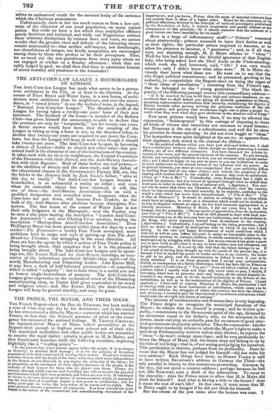THE ANTI-CORN-LAW LEAGUE A HOUSEHOLDER OF LONDON.
THE Anti-Corn-law League has made what seems to be a perma- nent settlement in the City, or at least in the liberties. At the corner of Fleet Street and Water Lane, is a new house, of archi- tecture more ambitious than its neighbours, and over the street- doors, in " raised letters" to use the technical term, is the legend, " National Anti-Corn-law League." The Standard scoffs at the League for having taken a twenty-one years lease of their new tenement. The landlord of the house—a member of the Reform Club—has given himself the unnecessary trouble to declare that the premises are only let " temporarily," not for twenty-one years. A better answer would have been, that the meaning of the League in taking so long a lease is not, as the Standard infers, to declare that twenty-one years are required to put down the Corn- laws, but that the League will keep at work even though it should take twenty-one years. The Anti-Corn-law League, by becoming a citizen of London—liable to church and other rates—has pre- sented itself in the character of one of the institutions of the country. It takes rank with its vis-à-vis neighbours, the Central Committee of the Dissenters with their Patriot, and the Anti-Slavery Associa- tion with their Reporter. Both of these bodies are real powers,— as the abolition of slavery and the slave-trade, and the defeat of the educational clauses in the Government's Factory Bill, are, like the bricks in the chimney built by Jack Cade's father, " alive at this day to testify." The Anti-Corn-law League become a householder, is as substantial a reality as either ; and even when its ostensible object has been obtained, it will, like one of them—the Anti-Slavery Association—live on with a modified designation and extended aims. Leaguers, when the Corn-laws are put down, will become Free Traders, as the bulk of the Anti-Slavers after abolition became Aborigines Pro- tectors. The fine house at the corner of Water Lane is not their only lodgment in the Metropolis : near the Poultry may be seen a zinc plate bearing the inscription "London Anti-Corn- law Association "; and near Charing Cross another, bearing the inscription " Metropolitan Anti-Corn-law Association." Even Wellington Street has been graced within these few days by a new settler—The Economist—a weekly Free Trade newspaper, more ambitious both in scope and style of getting-up than The Anti- Bread-tax Circular, but struggling in the same direction. All these are less the agents by which a system of Free Trade policy is being brought about, than symptoms that it is in the process of being brought about. The Anti-Corn-law League and its spout- lugs are, like Exeter Hall and its Anti-Slavery meetings, an ema- nation of the industrious provincial Middle-class spirit—of the sturdy Manufacturing and Dissenting bodies. Like Exeter Hall, it may have a dash of half-informed presumption—of something which is called " vulgarity" : but at least there is a useful aim and an honest single-heartedness of purpose. The Anti-Corn-law League gives expression to the economical creed of the Dissenting manufacturing class, as Exeter Hall gives expression to its moral and religious creed ; and, like Exeter Hall, the Anti-Corn-law League will keep its ground sturdily, and carry its point.


























 Previous page
Previous page